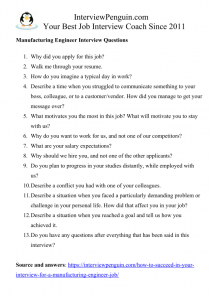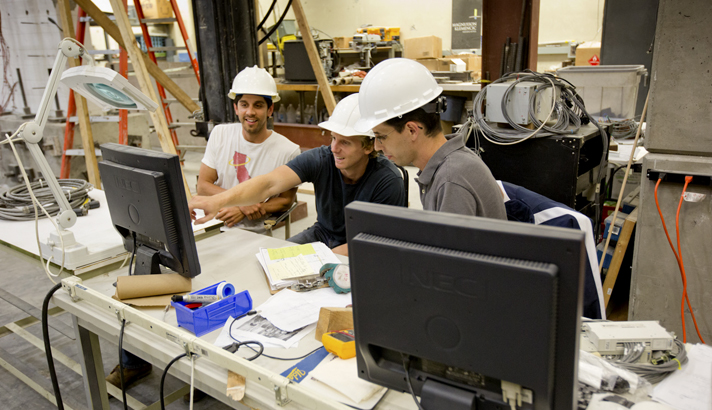Artificial intelligence may soon replace most people in the production process, but your position is safe. Manufacturing engineers will always play an essential role in factories, designing and operating computer networks, robots, machine tools, and materials-handling equipment.
What is more, this career pays well (even entry level engineers earn above $60,000 in average in the US), and you won’t need to outclass dozens of other people in the interviews. In fact, typically just a few people apply for each manufacturing engineer job opening. What will happen in your interviews? What matters for the hiring manages? And how can you improve your chances of making it through? We will try to find the answers together.
Table of Contents
Your resume, projects you’ve worked on
Like in most other engineering interviews, the hiring managers will try to learn more about the work you have already done. This is true for both experienced professionals and fresh graduates.
When fresh off the college, they may discuss your thesis, or projects you’ve worked on during your studies. When more experienced, the focus will be on real designs you’ve implemented and operated in your former jobs.
* Do not forget to check: Work Portfolio in an Interview – Learn how to present your best engineering works to the interviewers.
Remember that most hiring managers don’t excel in engineering, or in other technical skills. It is simply not their field of expertise. Therefor you should speak about your work in a simple way. Show them what you have done, and how it helped your former employer. Avoid excessive terminology and try to speak with enthusiasm about your work.
In most of the cases this will be enough to convince them of your readiness for a technical aspect of the job.
Interview Questions for Manufacturing Engineers
Once you walked through your resume, the interviewers will progress to ask some questions. Remember that in nine out of ten cases, they won’t ask you any technical questions. You have a degree in engineering, and (walking through your resume) they already know that you can handle the technical aspect of the job.
What is more, these people are HR professionals, not technicians. They have no clue about right answers to technical questions… So they will do their best to avoid asking them. Bering this in mind, you will deal with personal (screening) and especially with behavioral questions. Let’s have a look at some of them.
Why did you apply for this job?
Try to address both the position and the company in your answer. You can say that your education, skills, and professional interests make from you an ideal candidate for the job of manufacturing engineer. If you have any relevant experience, you can refer to it in your answer. But more than anything else, you should stress that you enjoy doing what engineers do in their work.
Secondly, refer to their company. Perhaps you find their production interesting, or the job challenging. Or you like their final products, vision and goals of the company, or something else. One way or another, you should clearly show them that you did not apply by accident, and know why you want to work for them.
How do you imagine a typical day in work?
Proactive approach is a keyword to remember. Tell them that you plan to do daily inspections, to always look for areas of manufacturing process you can improve.
Show them that you do not plan to sit in your nice office all day long, drinking coffee. But you plan to consult other employees, to walk in the production halls and look for things you can improve. Of course, the majority of time will be spent in front of the computer screen, where you will work on new designs and improvements to existing designs. But it is not the only thing engineers should do.
Read the job description carefully, together with the website of your future employer. Reading them should help you to understand what will be expected from you in the job.
Describe a time when you struggled to communicate something to your boss, colleague, or to a customer/vendor. How did you manage to get your message over?
Though often overlooked by employers, communication skills are crucial for a good manufacturing engineer. You will often take feedback, and give instructions, to people who lack technical knowledge.
Show the hiring managers that you are ready to step out of your comfort zone and change your language to get your message over. What is more, you can talk about various tools that help you with the task, such as illustrated charts, presentations, pictures, or a simple demonstration you’ll do for other employees to show them what they should do.
* Do not forget to check also: How to overcome interview nerves – Do not let anxiety to kill your chances in an interview.
What motivates you the most in this job? What will motivate you to stay with us?
Skilled manufacturing engineers are in high demand. Employers know that once you gain some experience with them, new doors will open for you, and you will get other job offers. They want to see whether they can count on you in a long run, whether it makes sense to invest in you.
The truth is that we never know what tomorrow will bring. You can not promise any employer that you will stay with them for five or for ten years. Once in an interview, however, you should try your best to convince them of your loyalty, and that you do not consider their company just a quick stop on the ladder of your professional career.
Refer to your desire to learn and grow together with the company. Tell them that you see opportunities for career growth with them, and that you believe the job itself is motivating enough to keep you going. You can also talk about positions you may get with them later on, such as Advanced Manufacturing Engineer, or Engineering Manager.
Other questions you may get in your interview
- Why do you want to work for us, and not one of our competitors?
- What are your salary expectations?
- Why should we hire you, and not one of the other applicants?
- Do you plan to progress in your studies distantly, while employed with us?
- Describe a conflict you had with one of your colleagues.
- Describe a situation when you faced a particularly demanding problem or challenge in your personal life. How did that affect you in your job?
- Describe a situation when you reached a goal and tell us how you achieved it.
- Tell us about a time when you used logic to solve a problem.
- Tell us about a situation when you showed initiative at work.
Conclusion, next steps
Interview for a job of a manufacturing engineer belongs to interviews with average difficulty. A core of the hiring process consists in talking about your resume and work you’ve already done, and in personal and behavioral questions.
Practice with the questions from our article, and do your homework, researching about your future employer, and the things they do in the company. And if you are not sure how to deal with the questions, have a look at our Interview Success Package. Great answers to all tough scenario-based (behavioral) questions will make your engineering interview much easier.
Thank you for checking it out, and good luck in your interview!
Matthew
* You can also download the list of questions in a one page long PDF, and practice your interview answers anytime later:

May also interest you:

